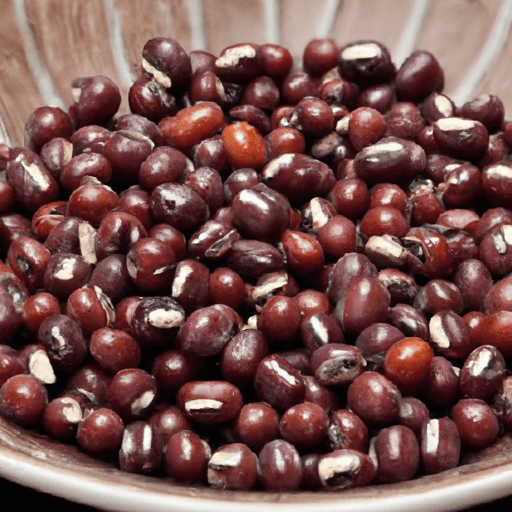Cooking with Dried Aduki Beans: A Nutritious and Versatile Ingredient
When it comes to versatile and nutritious ingredients, dried aduki beans certainly top the list. These tiny, deep maroon legumes have been enjoyed for centuries and continue to be a staple in many culinary traditions. From their distinctive taste to their numerous health benefits, aduki beans are a true gem in the world of cooking. In this blog post, we will explore the taste, common uses, nutritional value, and interesting history surrounding dried aduki beans.
Taste and Texture
Dried aduki beans have a delightful nutty and sweet flavor profile with a hint of earthiness. When cooked, they develop a creamy texture, making them perfect for soups, stews, and purees. Their softness allows them to effortlessly absorb the flavors of the ingredients they are cooked with, resulting in a harmonious blend of tastes.
Common Uses in Cooking
Dried aduki beans are incredibly versatile and can be used in a wide range of dishes. In Asian cuisines, they are often used in sweet treats, such as red bean paste or fillings for dumplings and mochi. These beans can also be cooked and added to hearty soups, salads, and vegetarian chili for a protein-packed and fiber-rich meal.
Besides their culinary uses, aduki beans can also be sprouted and added to salads or sandwiches, providing a crunchy texture and a fresh, slightly nutty taste. With just a hint of sweetness, they add a unique twist to any recipe.
Nutritional Value
Aduki beans are small but mighty when it comes to their nutritional content. Packed with protein, fiber, vitamins, and minerals, they make a valuable addition to any healthy diet. Here is a closer look at their nutritional profile:
- Protein: Aduki beans are an excellent plant-based source of protein, making them an ideal choice for vegetarian or vegan diets. They contain all essential amino acids necessary for building and repairing tissues.
- Fiber: These beans are loaded with dietary fiber, which can help regulate digestion, control blood sugar levels, and promote a healthy heart.
- Vitamins and Minerals: Dried aduki beans are a good source of iron, magnesium, potassium, and folate. These micronutrients play vital roles in supporting overall health and wellbeing.
History and Interesting Facts
Aduki beans have a rich history that dates back thousands of years. Originating in East Asia, these beans have been cultivated and consumed in China, Japan, and Korea since ancient times. They hold a special place in traditional Chinese medicine, where they are believed to have a balancing effect on the body’s energies.
In Japan, aduki beans are a key ingredient in the iconic dessert known as “anmitsu,” a delightful combination of sweet red bean paste, agar jelly, and various toppings. This culinary tradition highlights the importance of aduki beans in Japanese culture.
Conclusion
Dried aduki beans are a true culinary powerhouse, offering a delightful taste, versatility in the kitchen, and a remarkable nutritional profile. Whether you incorporate them into savory dishes or use them to create sweet treats, these tiny legumes are bound to leave a lasting impression on your taste buds and your overall well-being. So why not give aduki beans a try? Your palate and your body will thank you!
Remember to always soak dried aduki beans overnight before cooking to ensure optimal tenderness and shorter cooking time. Get creative and experiment with different recipes to explore the endless possibilities of this remarkable ingredient. Happy cooking!
Origin:
Dried aduki beans, also known as adzuki or azuki beans, have a long history and are native to East Asia. They were first cultivated in China thousands of years ago and have since become widely grown in countries such as Japan, Korea, and India.
Common Uses:
These small, reddish-brown beans are popular in a variety of Asian cuisines. They are commonly used to make sweet red bean paste, used in many traditional Japanese desserts such as dorayaki and taiyaki. In China and Korea, aduki beans are often used in porridges, soups, and sweetened drinks. They can also be cooked in stews, curries, and stir-fries.
Nutritional Benefits:
Aduki beans are a nutritious ingredient with several health benefits. They are a good source of dietary fiber, protein, and complex carbohydrates. They contain essential minerals such as potassium, magnesium, iron, and zinc. Aduki beans are also low in fat and cholesterol, making them a healthy option for those looking to incorporate more plant-based proteins into their diet.
Unique Properties and Historical Significance:
Aduki beans have long been valued for their medicinal properties in traditional Asian medicine. They are believed to strengthen the kidneys, aid detoxification, and promote healthy digestion. Additionally, these beans are considered to have a cooling effect on the body and are often consumed during the summer months to help combat heat.
In Japan, aduki beans hold cultural significance and are associated with celebrations and festivals. The beans are commonly used as a symbol of good luck and prosperity, especially during the New Year’s celebrations.
Overall, dried aduki beans are a versatile and nutritious ingredient that has played an important role in the culinary traditions of East Asia for centuries.




Use the share button below if you liked it.
It makes me smile, when I see it.